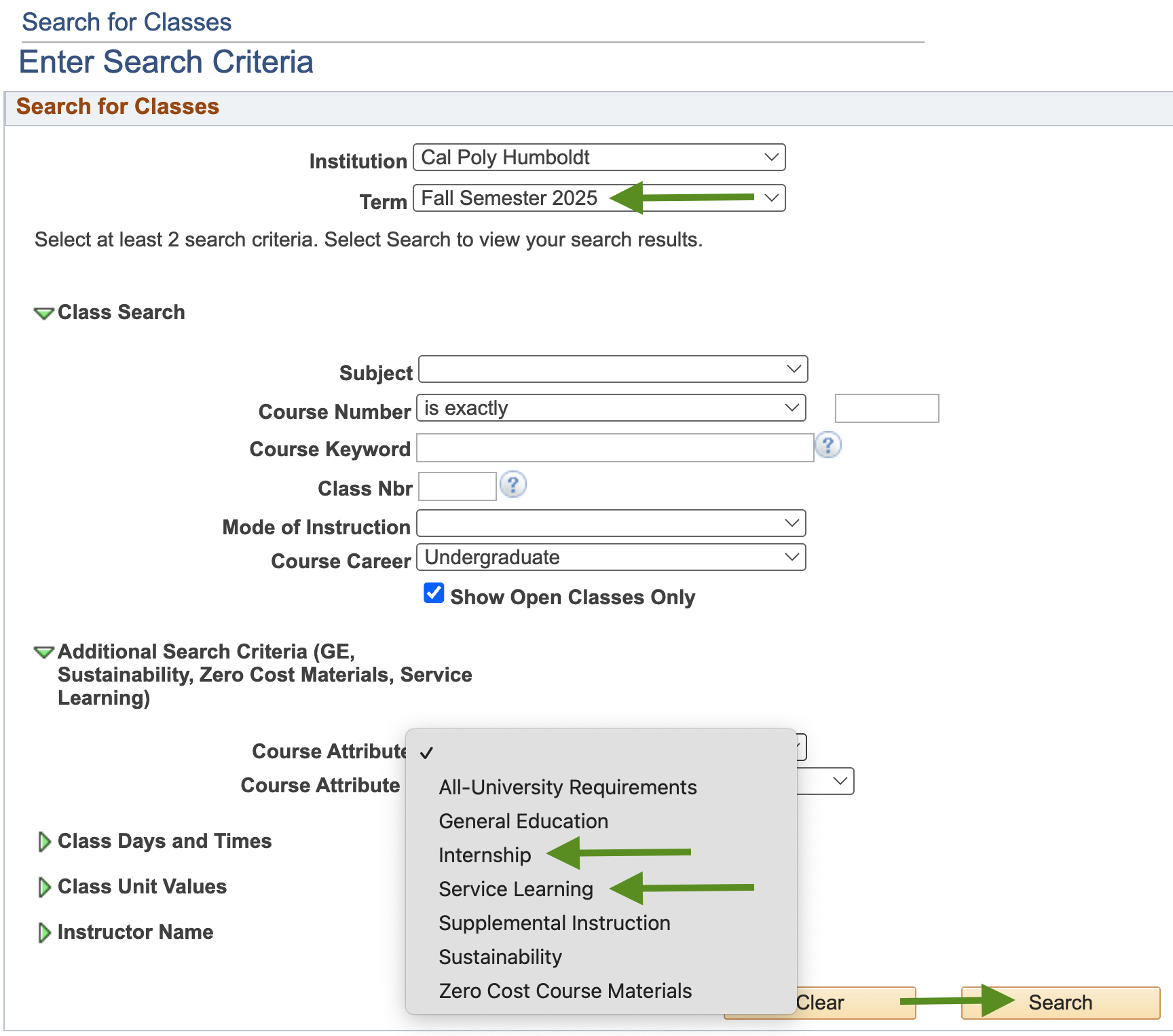Breadcrumb
Student Resources
Tips, Rights, Responsibilities, and Resources
- Polish up your résumé, curriculum vitae, and portfolio. Contact the Career Development Center for support.
- Go to Job Fairs - employers often share internship opportunities, and recruiters may have tips. Cal Poly
Humboldt hosts the Spring Career Expo and Volunteer Fair in February. In the fall, look for the Part-Time Job
Fair and the Engineering Internship & Job Fair. - Attend the Arcata Chamber of Commerce Young Professionals Mixers to build connections and learn about
new opportunities. - Explore websites of organizations/corporations in your field of interest to see if they offer internships.
Subscribe to organization newsletters to keep up on the latest opportunities. Cold call them to find out more - try asking for “the person in charge of internships.” - Make general approaches (call, email, visit in person, check out websites and social media) to the local
organizations that interest you to see if they have or can develop an internship (paid or unpaid, depending on the organization's offerings). - Ask faculty in your field of interest to recommend industry-related organizations and businesses offering
internships. - Talk with your friends/peers who have secured internships.
- How to Find an Internship guide gathers a range of resources and places to search for internships, as they vary widely depending on organizational opportunities, educational connections, and Cal Poly Humboldt department and program offerings.
- Know what you want out of volunteering. You can volunteer in order to promote a cause, advance your career, meet new friends, gain recognition, or simply enjoy the personal satisfaction that comes from helping others.
- Research before you approach an agency about volunteering with its programs. Check out its website to see if current information on volunteer opportunities and programs is available.
- Find out about the agency’s purpose and how your role as a volunteer fits into that mission. Sometimes what may seem an insignificant contribution to you, makes all the difference to the people or to the program that you are assisting.
- Keep your eyes and ears open when you are at schools, libraries, places of worship, hospitals, and civic and arts events. Check out local media, websites, and newspapers. They are all good places to find out about volunteer opportunities.
- When you contact an agency, ask for the “Volunteer Coordinator” or “the person in charge of volunteers” if that information is not provided on their website or materials.
- Be realistic and clear about the amount of time you can commit. It is easier to start small and increase your commitment than to have to back out because your schedule is overwhelming you. Be sure to ask about time commitments - many programs require a year-long commitment from volunteers, typically those working with children, or requiring training.
- Think about your skills, interests, and life experiences, and how they could be useful in a volunteer setting.
- Visit the organization you are interested in before committing yourself. Get a sense of the staff and clients you will be working with and a feel for the overall environment.
- Respect confidentiality in volunteer settings.
- When setting your volunteer schedule, ask about the best process and contact if you need to miss a session due to sickness, etc. In many cases, volunteer programs depend on your attendance and there might be repercussions if you miss your scheduled time to serve.
- Ask about training and supervision. If an organization is asking you to perform a task, will it provide the support necessary for you to be successful?
- Volunteering is an opportunity for personal growth. Request an evaluation of the work you have performed or a letter of recommendation, should you decide to list your volunteer service on a school or job application.
Most importantly of all, bring your heart and sense of humor to your volunteer service, along with an enthusiastic spirit, which is in itself a priceless gift.
- To be assigned a job that is worthwhile and challenging, with freedom to use existing skills or develop new ones.
- To be trusted with confidential information when appropriate.
- To be kept informed about what is going on in your organization.
- To receive orientation, training, and supervision for the job you accept, and to know why you are asked to do a particular job.
- To expect that your time will not be wasted by a lack of planning, coordination, and cooperation within your organization.
- To be evaluated to know whether your work is effective and how it can be improved, in order to have a chance to increase understanding of yourself, others, and your community.
- To indicate when out-of-pocket costs are too great for you.
- To declare allowable non-reimbursed, out-of-pocket costs for income tax purposes if serving with a charitable organization.
- To expect valid recommendations and encouragement from your supervisor so you can move to another job, paid or volunteer.
- To be given appropriate recognition in the form of awards, certificates of achievement, etc., but even more important, recognition of your day-to-day contributions by other participants in the volunteering relationship.
- To accept only as much responsibility as you can handle.
- To respect the confidences of your sponsoring organization and its clients.
- To notify your supervisor when you need a substitute. If you decide to quit, explain when and why.
- To follow guidelines established by the organization, such as dress code, etc.
- To use reasonable judgment in making decisions when there appears to be no policy or the policy is not communicated to you. Then, as soon as possible, consult with your supervisor for future guidance.
- To provide feedback, suggestions, and recommendations to the supervisor and staff if these might increase the effectiveness of the program.
- To be considerate and work as a member of a team with all staff and other volunteers.
Before the start of your placement, your host site should provide an orientation to the site, including what to do in an emergency.
Check out the Campus Emergency Preparedness website to refresh your memory.
If you have been injured at your site placement, contact:
Cris Jones Koczera
Associate Vice President for Campus Resilience and Response
(707) 826-4635
Christina.Jones@humboldt.edu
Risk Management & Safety Service
If you believe that you have been discriminated against or harassed at your site placement, contact:
David Hickcox
Title IX Coordinator and DHR Prevention Administrator
(707) 826-5177
David.Hickcox@humboldt.edu
Title IX and Discrimination, Harassment & Retaliation Prevention
Service Learning and Academic Internship Courses in course catalog and class schedule
At Cal Poly Humboldt, Service Learning courses are identified by the letter "S" at the end of the course number (for example, ENST 490S - Environmental Studies Capstone Experience with Service Learning). Additionally, frequently the words "service learning" are included in the course title (as in the example above).
At Cal Poly Humboldt, Academic Internship courses have the word "Internship" in the course title, and their course numbers typically end in "82" (for example, Art 482 - Museum & Gallery Practices Internship).
The Class Schedule is posted every semester and it contains the specific class offerings planned for the upcoming semester.
During the registration period, navigate to the Cal Poly Humboldt Class Schedule page to search for all class opportunities of interest to you. You may also perform the same search using the Class Search functionality in your Student Center.
When you arrive on the Class Search page, make sure to select the semester for which you plan on registering from the Term dropdown menu. Note that no more than 1-2 semesters' schedules are planned into the future and posted for your browsing.
Next, select the Additional Search Criteria item to expand it. From the Course Attribute dropdown menu, select Internship OR Service Learning. Lastly, select the Search button to see the list of classes that match your search criteria.

Note that the search criteria will default to undergraduate and open classes. You may change these criteria by selecting Postbaccalaureate from the Course Career dropdown menu or unchecking the Show Open Classes Only Internships checkbox.
The Course Catalog is posted annually and it contains a list of all active courses in the Cal Poly Humboldt repertoire. Not all of these courses are offered every semester. To learn how to view the specific semester's offerings, check out the instructions above.
To peruse the Cal Poly Humboldt Course Catalog, navigate to the Catalog page, then in the top portion of the navigation bar, locate the Catalog Search criteria.
The first criterion will default to Entire Catalog, but to find courses, select Courses from the dropdown menu.
Then, in the search bar below, enter Internship OR Service Learning, select the Whole Word/Phrase checkbox below, and finally select the magnifying glass icon at the end of the search bar.

S4 Walkthroughs
What is S4 and How to Find It (This Google doc requires Cal Poly Humboldt login to open.)
How to Report Your Community Placement in S4 (This Google doc requires Cal Poly Humboldt login to open.)
How to Fill Out Forms in S4 (This Google doc requires Cal Poly Humboldt login to open.)
How to Create a Time Log and Report Your Time in S4 (This Google doc requires Cal Poly Humboldt login to open.)





